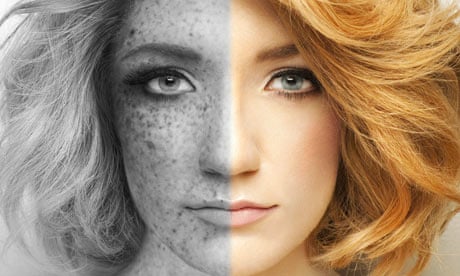Nicola Roberts always felt like the ugly one in Girls Aloud. Partly it was her age – when the group was formed by a reality TV show in 2002, she was only 16 and struggling with the normal insecurities of any teenage girl. Overnight, the red-haired girl from Runcorn was catapulted into the public eye and posing for photo-shoots alongside four preternaturally gorgeous band-mates, including Cheryl Cole. But mostly, Roberts says, she felt ugly because of her pale skin.
"I used to do fake tanning because I was told that I didn't look great," she explains. "Being brown is something that people find attractive so I thought at least I could make that piece of the jigsaw fit. The newspapers would always refer to the other girls like 'stunning Sarah [Harding]' and I never had that prefix. I wanted that, at 16."
In the early days of her career, her obsession with fake tanning started to rule her life. "Sometimes, it would be 12 at night, we'd get in from a gig and we'd have to do GMTV next morning. I would get into the shower, scrub off the old fake tan, moisturise, then put new fake tan on, then get into bed at 1.30 knowing I had to be up at 4.30 and I'd say to myself 'No pain, no gain. You've got to do this in order for people to think you look nice'." Roberts tried sunbeds but found they burned her skin. What did her fellow band members think of her attachment to fake tan? "They thought it was absolutely ridiculous," she grins. "They were like, 'Please just be pale.'"
At 24, Roberts's concern over the rising popularity of sunbeds and spiralling rates of skin cancer in the UK has prompted her to front a BBC3 documentary, The Truth About Tanning. In it, Roberts explores what motivates the so-called "tanorexics" and discovers the true health cost of prolonged exposure to UV rays. "There is no treatment for skin cancer and people are ignorant." She spoke to a couple of the girls who had had moles cut out I wanted to shake them and say, 'Are you stupid?'"
Roberts, whose grandfather died from cancer, is under no illusions about the serious consequences of the UK's continuing love affair with tanning salons – the International Agency for Research on Cancer recently found that the risk of melanoma was increased by 75% in people who started using sunbeds regularly before the age of 30. "I want cancer rates to fall. I want people to stop being so obsessed with the way they look," says Roberts. "We've got ourselves into a very vain state of society and there's more important things."
The documentary follows Roberts as she meets health secretary Andy Burnham and bashes his ears over the need for a law banning sunbed use for under-18s. What did she make of Mr Burnham? "He's lovely, a nice man and if he pushes the law through, I'll say nicer things about him. No disrespect to MPs, but people where I'm from feel the government is far-removed. It's frustrating it takes so long to change a law."
As she grew older and more self-assured, Roberts found herself tiring of the midnight self-tanning routine. Encouraged by her management and her bandmates, she let herself return to her natural colouring. When we meet in a central London hotel, she is gloriously pale, her skin glinting like alabaster in the evening light.
"I'm now really happy being pale. The tan used to be my armour; now my 'thing' is my pale skin..."
She's still concentrating her efforts on lobbying that nice Mr Burnham. "Just change the law," she says. "It doesn't take a genius. It's black and white. This isn't a grey issue."
And presumably not a brown one either? Roberts laughs. "That's a good one. No, definitely not brown."
